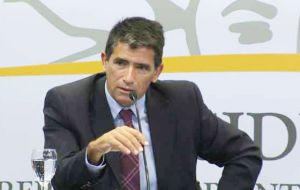MercoPress. South Atlantic News Agency
Mercosur/EU hope 'for positive news in third quarter' despite members' domestic problems
 Sendic revealed that not only Argentina has 'difficulties' for a Mercosur/EU accord: the same can be said of several European countries
Sendic revealed that not only Argentina has 'difficulties' for a Mercosur/EU accord: the same can be said of several European countries  A most positive side of the meeting was that German Chancellor Angela Merkel insisted on the need to formalize as soon as possible an EU/Mercosur agreement
A most positive side of the meeting was that German Chancellor Angela Merkel insisted on the need to formalize as soon as possible an EU/Mercosur agreement  Sendic admitted that if the exchange of proposals effectively advances, ”the signing of the agreement will only take place during the following year (2016).
Sendic admitted that if the exchange of proposals effectively advances, ”the signing of the agreement will only take place during the following year (2016). The European Union also has difficulties in completing a draft proposal of goods and services to exchange with Mercosur in the search for a long delayed trade agreement between the two blocks, revealed Uruguayan vice-president Raul Sendic during a report to the Senate on his recent 10/11 June trip to Brussels for the Celac/EU summit. However in “the third quarter of the year there should be positive news”.
“Let me tell you that there are not only difficulties such as those with Argentina, since there are European countries that face difficulties regarding farm policies and they see Mercosur as a very efficient competitor in agriculture terms”, said Sendic who was part of the Uruguayan delegation together with foreign minister Rodolfo Nin Novoa.
The Uruguayan delegation together with their Brazilian counterparts had as their main objective of the Mercosur/EU meeting, on the sidelines of the Celac/EU summit, to agree on a date for the exchange of proposals with Europe for the encompassing trade agreement.
“We agreed, both blocks, to advance simultaneously agreeing on the exchange of 'offensive and defensive lists' of 4.000 goods”, from the four Mercosur members, Argentina, Brazil, Paraguay and Uruguay and the 28 countries from EU.
Sendic said even when Argentina did not object to a free trade agreement of Mercosur with the EU, “they did request more time for the exchange of proposals with the list of goods and services which will be subject to lower tariffs”.
However “we did agree that in the course of the third quarter both sides would present their proposals 'sufficiently encompassing' so that we can move into the chapter of progressive elimination of tariffs on an agreed list of goods and services”, pointed out Sendic.
“The commitment from both sides is to present a greater opening to what we have been showing or advancing so far. But overall we have an optimistic position regarding the content of the proposal lists”.
The Uruguayan vice-president said the foreign ministry is now involved in processing the joint effort promised by Mercosur with the remaining three members. Nevertheless Sendic admitted that if the exchange of proposals effectively advances, ”the signing of the agreement will only take place during the following year (2016).
“I think the most positive side of the meeting in Brussels was the fact that German Chancellor Angela Merkel insisted on the need to formalize as soon as possible an EU/Mercosur agreement, and if necessary a 'two speeds' approach was acceptable”, underlined Sendic.
The Uruguayan official also pointed out to the bilateral cooperation understanding reached between EU and Uruguay to promote scientific research, drugs policy, migration, security and joining efforts in combating poverty.
Finally Sendic revealed to Senators that visiting leaders had a 'semi confidential' meeting with their European counterparts where the issues that most concern EU were addressed and they included: standing threat from terrorism; Russia's stance regarding Ukraine and its impact on the EU and finally the massive migration into the continent which had divided EU members hits harder Mediterranean countries.




Top Comments
Disclaimer & comment rules-

Read all commentsHere are important features. Most EU members don't want mercosur. Shouldn't forget that it's also a 'co-operation' agreement. Could we send illegal Mediterranean migrants to south america? Or does it mean Europe has to accept indigenous individuals fleeing south america to avoid persecution?
Jun 18th, 2015 - 05:22 pm 0Commenting for this story is now closed.
If you have a Facebook account, become a fan and comment on our Facebook Page!